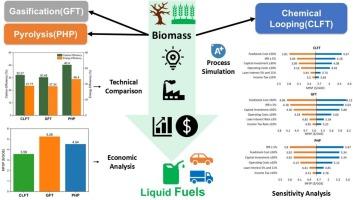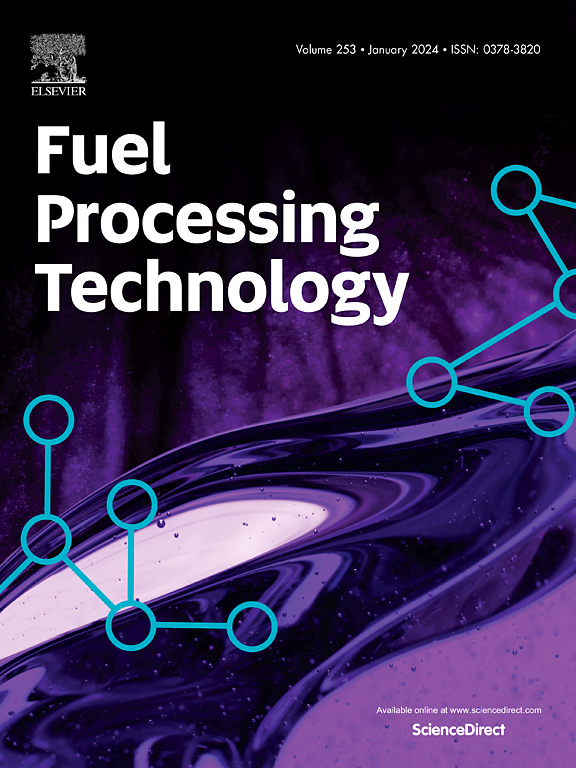Techno-economic assessment of biomass-to-liquid fuel production via chemical looping in comparison to conventional pathways
IF 7.7
2区 工程技术
Q1 CHEMISTRY, APPLIED
引用次数: 0
Abstract
Rising liquid fuel demand is increasing CO₂ emissions, making renewable biomass technologies vital for a low-carbon future. This study presents a chemical looping-based biomass conversion process integrated with Fischer-Tropsch synthesis (CLFT) for liquid fuel production and evaluates its techno-economic performance against two established biomass-based pathways: biomass gasification to liquid fuels (GFT) and biomass pyrolysis to liquid fuels (PHP). A minimum fuel selling price (MFSP) analysis, conducted using a discounted cash flow approach, estimates MFSP values of $3.59/GGE for CLFT, $5.26/GGE for GFT, and $4.54/GGE for PHP. The energy efficiencies of CLFT, GFT, and PHP are at 37.7 %, 37.3 %, and 46.4 %, respectively, while their carbon conversion efficiencies are 32.3 %, 30.5 %, and 40.4 %. Sensitivity analyses reveal that feedstock cost exerts the greatest influence on MFSP, followed by the internal rate of return and capital expenditures. Additionally, a 50 % increase in plant capacity (from the baseline 2000 dry tons/day of biomass) results in only an 11 % reduction in MFSP, whereas a 50 % decrease in plant size leads to a 17 % increase in MFSP. These findings highlight CLFT's economic and technical advantages, reinforcing its promise as a cost-effective, sustainable fuel generation alternative.

与传统途径相比,通过化学循环对生物质制液体燃料生产的技术经济评估
不断增长的液体燃料需求增加了二氧化碳排放量,使可再生生物质技术对低碳未来至关重要。本研究提出了一种基于化学环的生物质转化过程,结合费托合成(CLFT)用于液体燃料的生产,并针对两种已建立的生物质转化途径:生物质气化制液体燃料(GFT)和生物质热解制液体燃料(PHP),评估了其技术经济性能。使用贴现现金流方法进行的最低燃料销售价格(MFSP)分析估计,CLFT的MFSP值为3.59美元/GGE, GFT为5.26美元/GGE, PHP为4.54美元/GGE。CLFT、GFT和PHP的能源效率分别为37.7%、37.3%和46.4%,而它们的碳转换效率分别为32.3%、30.5%和40.4%。敏感性分析表明,原料成本对MFSP的影响最大,其次是内部收益率和资本支出。此外,植物容量增加50%(以2000干吨/天生物量为基准)只会导致MFSP减少11%,而植物规模减少50%则会导致MFSP增加17%。这些发现突出了CLFT的经济和技术优势,加强了其作为具有成本效益的可持续燃料发电替代品的承诺。
本文章由计算机程序翻译,如有差异,请以英文原文为准。
求助全文
约1分钟内获得全文
求助全文
来源期刊

Fuel Processing Technology
工程技术-工程:化工
CiteScore
13.20
自引率
9.30%
发文量
398
审稿时长
26 days
期刊介绍:
Fuel Processing Technology (FPT) deals with the scientific and technological aspects of converting fossil and renewable resources to clean fuels, value-added chemicals, fuel-related advanced carbon materials and by-products. In addition to the traditional non-nuclear fossil fuels, biomass and wastes, papers on the integration of renewables such as solar and wind energy and energy storage into the fuel processing processes, as well as papers on the production and conversion of non-carbon-containing fuels such as hydrogen and ammonia, are also welcome. While chemical conversion is emphasized, papers on advanced physical conversion processes are also considered for publication in FPT. Papers on the fundamental aspects of fuel structure and properties will also be considered.
 求助内容:
求助内容: 应助结果提醒方式:
应助结果提醒方式:


